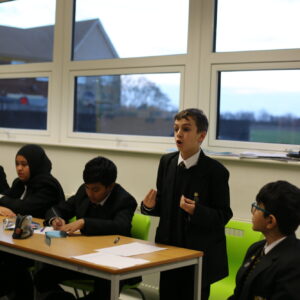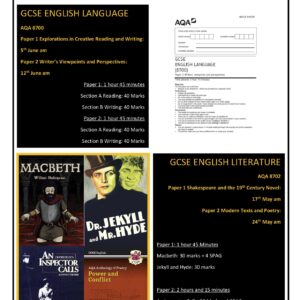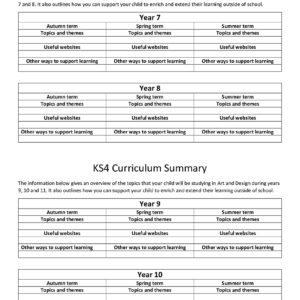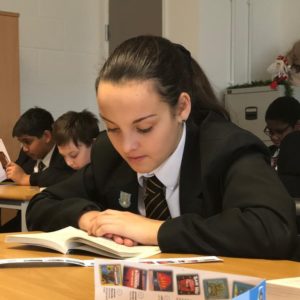Welcome to the English Department. All staff in this department aim for our students to develop as enthusiastic, independent, intelligent and detailed responders of texts. Students investigate the ideas and perspectives of writers and readers and how these are influenced by contextual factors. They also develop their ability to explore the methods used by writers and how these create meaning.
Students also develop their own writing skills: students are taught to communicate in a way that is clear and effective; they make increasingly sophisticated choices regarding punctuation, vocabulary, phrasing, linguistic devices and structural features, producing writing that is engaging.
Developing spoken language skills is a key part of our curriculum. Students are encouraged to be audible and use Standard English correctly when expressing challenging ideas, perspectives and feelings. We ensure that they can organise and structure their spoken language appropriately to meet the needs of their audience and respond formally and in detail to questions asked.
We are committed to character education and our curriculum promotes a PROUD ethos, encouraging students to be moral, responsible, fair and respectful individuals, mainly through the teaching of literary and non-literary fiction. Furthermore, many of our texts are written by authors from different cultures – or are about different cultures – exposing our students to a wider world and developing them as well-rounded citizens of it. This also provides an opportunity to explore and celebrate the ethnic, cultural and religious diversity of the students within our school
Key Stage 3
At KS3, our curriculum supports students as they:
- develop an appreciation and love of reading and read increasingly challenging material, involving the study of a wide range of fiction and non-fiction covering various genres, historical periods, forms and authors·
- begin to develop critical reading skills through Reciprocal Reading strategies and the principles of WHAT, HOW, WHY?
- write accurately, fluently, effectively and at length for pleasure and information, writing for a range of purposes, including narrative and descriptive writing as well as argumentative and persuasive writing.
- use Spoken English in more formal settings, such as the use of speeches and presentations, as well as improvising, rehearsing and performing play scripts and poetry.
Key Stage 4
At KS4, our curriculum supports students as they:
- read and appreciate the depth and power of the English literary heritage and read a wide range of high quality, challenging classical literature and extended literary non-fiction, such as essays, reviews and journalism.
- develop their critical reading skills and WHAT, HOW, WHY? strategies to focus on critical evaluation of plot, characterisation, events, setting, themes and writer’s techniques.
- adapt their writing for a range of purposes and audiences: to describe, narrate, explain, instruct, give and respond to information and argue. They also develop the ability to select and use judiciously vocabulary, grammar, form, and structural and organisational features, including rhetorical devices, to reflect audience, purpose and context, and use Standard English where appropriate.
- speak confidently, audibly and effectively. As at KS3, this is done through both formal and informal discussion and presentations. There is a discrete Spoken Language unit at KS4 as students prepare for the assessed Spoken Language element of their GCSE.
Key Stage 5
At KS5, our curriculum supports students as they:
- read widely and independently, including set texts and others that they have selected for themselves.
- engage critically and creatively with a substantial body of texts and ways of responding to them.
- develop and effectively apply their knowledge of literary analysis and evaluation.
- explore the contexts of the texts they are reading and others’ interpretation of them.
- undertake independent and sustained studies to deepen their appreciation and undertaking of English literature, including its changing traditions.
Curriculum Enrichment
The English Department are partnered with numerous external providers and programmes, including ‘Debate Mate!,’ Jack Petchey ‘Speak Out!,’ and the National Literacy Trust’s ‘Young City Poets.’ We are signed up to Book Buzz, a programme in which all students in Year 7 receive a free novel to read for pleasure.
We offer extra-curriculum clubs, such as Creative Writing and Eastbrook Reporters. We also organise enrichment trips. We annually take students to the Guardian newspaper to experience a day in the life of a reporter. We regularly take students to the theatre; we recently took Year 10 to see a performance of Macbeth and Year 12 to see a performance of Waiting for Godot. We also take students to lectures and seminars, such as Poetry Live!, Queen Mary University Study Days and the Oxford series of A Level lectures.
At KS4, students are invited to attend our weekly Study Hub where they can attend lectures, seminars or private study in our dedicated study suite in preparation for their GCSE.
Homework
For all year groups, homework is regularly set on Show My Homework and includes assignments and quizzes. Tasks may involve researching new topics and acquiring new information, consolidating work taught in class, or revisiting, recalling and revising previously acquired knowledge and skills.
At KS3, students use Bedrock learning as an online homework platform to improve vocabulary and reading skills. We also use homework as a way to promote both reading and writing for pleasure, including the a KS3 Writing Journal and the upcoming Eastbrook Reading Passport.
Career Opportunities
Employers love successful English students: research shows companies value communication, collaboration, critical thinking, independence, adaptability – and English teaches these.
Possible careers include:
- Journalist
- Digital copywriter
- Publishing proof-reader
- Editorial assistant
- Web content manager
- Public relations officer
- Arts administrator
- Writer
- Marketing executive
- Academic librarian
- Teacher
- Lexicographer
Exam Boards
We currently follow these specifications:
- GCSE AQA English Language (8700)
- GCSE AQA English Literature (8702)
- A Level Edexcel English Literature (9ET0)
Support for exams
- Seneca Learning: https://www.senecalearning.com/en-GB/
- GCSE Pod: https://www.gcsepod.com/
- British Library Macbeth: https://www.bl.uk/works/macbeth
- British Library An Inspector Calls: https://www.bl.uk/20th-century-literature/articles/an-introduction-to-an-inspector-calls
- British Library Jekyll and Hyde: https://www.bl.uk/works/the-strange-case-of-dr-jekyll-and-mr-hyde
- Language Specimen Paper 1: https://filestore.aqa.org.uk/resources/no_index/AQA-87001-SQP.PDF
- Language Specimen Paper 2: https://filestore.aqa.org.uk/resources/english/AQA-87002-SQP.PDF
- Language Specimen Paper 2 Insert: https://filestore.aqa.org.uk/resources/english/AQA-87002-SIN.PDF
- English Literature Specimen Paper 1: https://filestore.aqa.org.uk/resources/english/AQA-87021-SQP-V1.PDF
- English Literature Specimen Paper 2: https://filestore.aqa.org.uk/resources/english/AQA-87022-SQP.P





